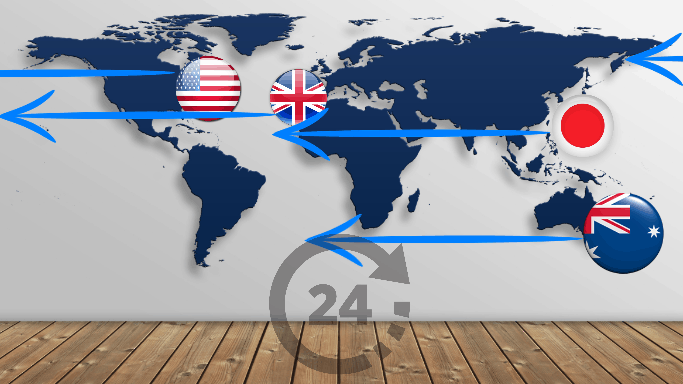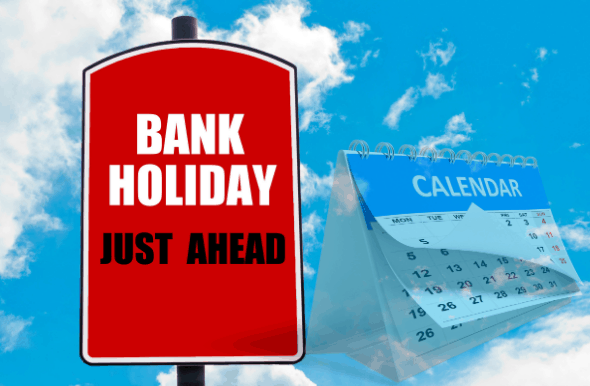The exchange market is open 24 hours a day, allowing you to trade the biggest market in the world, starting from Sunday at 10:00 PM BST with the Sydney trading session, followed closely by the Tokyo stock exchange and overlapping with overseas markets until 10:00 PM BST on Friday with the New York session close.
What are Forex Market Hours for UK Currency Traders?
Forex markets operate around the clock, 24 hours a day, five days a week.
For UK traders, markets are open from 8:00 am GMT on Monday, and continue uninterrupted until 8:00 am GMT on Saturday.
Forex Market Opening Times
Forex market sessions and opening times are divided into four major trading sessions, corresponding to the financial centres of London, New York, Tokyo, and Sydney.
- London session starts at 8:00 AM BST and ends at 4:00 PM BST
- New York session starts at 1:00 PM BST and ends at 10:00 PM BST
- Sydney session starts at 10:00 PM BST and ends at 7:00 AM BST
- Tokyo session starts at 1:00 AM BST and ends at 10:00 AM BST
Unlike stock markets which have fixed closing times, forex markets operate continuously throughout the week thanks to its four major global trading sessions.
This means UK traders have trading opportunities even outside standard UK trading hours.
Forex Trading Time Zone Converter
The Forex Market Time Zone Converter below is a valuable resource for UK traders. It highlights the four keys trading sessions, showing when they overlap and the trading volume at that time. By moving the draggable clock left or right to your preferred time, you can view the corresponding times and opening times for the other sessions.
Forex Market Time Zone Converter
- 0
- 1
- 2
- 3
- 4
- 5
- 6
- 7
- 8
- 9
- 10
- 11
- 12
- 1
- 2
- 3
- 4
- 5
- 6
- 7
- 8
- 9
- 10
- 11
- 12
- 0
- 1
- 2
- 3
- 4
- 5
- 6
- 7
- 8
- 9
- 10
- 11
- 12
- 13
- 14
- 15
- 16
- 17
- 18
- 19
- 20
- 21
- 22
- 23
- 24

Sydney
(UTC +10)

Tokyo
(UTC +9)

London
(UTC +1)

New York
(UTC -4)
Trading Volume is usually
at this time of day.




When is the Best Time to Trade Forex in the UK?
For UK residents, the best times to trade forex are during the overlapping hours of the London, Sydney, Tokyo, and New York trading sessions.
The overlapping hours provide the greatest liquidity and volatility.
Forex Trading Hours: Specific Sessions and High-Volume Hours
As a general rule, the Pound crosses will usually be most active during regular London trading hours. While the GBP crosses are actively traded around the clock, they tend to be traded more during the hours when the UK market is open.
This trading phenomenon exists because the economic data relevant and more impactful for the Sterling are released during UK business hours.
What Period Has The Highest Currency Volume?
The busiest period of forex trading is when the UK session overlaps the USA session for about four hours, between 1:00 PM BST and 4:00 PM BST.
Liquidity tends to increase significantly during this trading time slot, providing more trading opportunities. There is no assurance that this time slot will produce the same type of trades regularly.
A volatile market where trading activity abounds will give you a good opportunity to spot profitable trading signals that can’t be noticed in slow trading sessions, which can waste your time and efforts.
Minor Forex Market Sessions
The global minor trading centres around the world include:
- Wellington
- Frankfurt
- Hong Kong
- Singapore
The best time to trade the forex market is during the London trading hours because the global market players are most active and doing business during this time. When the London trading hours overlap the New York trading hours, that’s considered the most liquid time of the day.
Forex Trading Hours In The UK (British Standard Time [BST])

The forex trading hours in the United Kingdom (UK) correspond to the regular business hours in London. Based on British Standard Time BST, the London session starts at 8:00 AM BST and closes at 4:00 PM BST. But, since the forex market opens with the Tokyo opening session at 1:00 AM BST and carries through until the New York session closes at 10:00 PM BST.
Trading Forex During the London Session in the UK
|
London Session |
Local Time: UK (BST) | Time in Australia (AEST) | Time in Japan (JST) |
Time in the US (EST) |
|
Open |
9:00 | 18:00 | 16:00 |
3:00 |
|
Close |
17:00 | 2:00 | 0:00 |
11:00 |
Trading Forex During the New York Session in the UK
|
New York Session |
Time in the UK (BST) | Local Time: US (EST) | Time in Australia (AEST) |
Time in Japan (JST) |
|
Open |
13:00 | 8:00 | 23:00 |
21:00 |
|
Close |
22:00 | 17:00 | 8:00 |
6:00 |
Trading Forex During the Tokyo Session in the UK
|
Tokyo Session |
Time in the UK (BST) | Local Time: Japan (JST) |
Time in Australia (AEST) |
Time in the US (EST) |
|
Open |
0:00 | 9:00 | 10:00 |
19:00 |
| Close | 9:00 | 18:00 | 19:00 |
4:00 |
Trading Forex During the Sydney Session in the UK
|
Sydney Session |
Time in the UK (BST) |
Local Time: Australia (AEST) | Time in Japan (JST) | Time in the US (EST) |
|
Open |
19:00 | 8:00 | 10:00 |
17:00 |
| Close | 3:00 | 16:00 | 18:00 |
1:00 |
The market is constantly open for business from Sunday to Friday evening. There is always going to be a financial centre open around the world.
How To Trade Forex
Retail investor accounts wanting access to financial markets can sign up with a forex and CFD broker. If you are a beginner trader, you should utilise one of the best forex demo accounts before trading with real money. When signing up for a new trading account, you must make a minimum deposit and choose a base currency. Different brokers offer varying base currencies, yet common options include USD, EUR, JPY, or AUD. Forex brokers may also allow scalping or copy trading, which automates forex trading on financial markets. Learn more from our list of best copy trading platforms.
When trading forex via retail investor accounts, you trade financial instruments called contracts for difference (CFDs). CFDs allow speculating on future price movements without buying or selling the underlying asset. For instance, if you want to take advantage of the high volatility in the EUR/USD, you can trade EUR/USD CFDs without needing to exchange the physical currency.
What Moves the Forex Market?
The forex currency pairs can experience the highest FX volume activity during the following:
1. Central Banks Interest Rate Decision
Central bank interest rate decisions like the BOE rate can impact the GBP currency trend. These long-lasting macro forces motivate big investors to dump or buy one particular currency pair. Knowing when the key interest rate announcements are scheduled is paramount, as this will generate above-average FX volume activity.
2. Government Reports
Other trading hours traders must keep an eye on for generating significant trading volume are:
- Release time of government reports
- Release of economic news
National governments have a big impact on the currency market since they are the ones who establish monetary policies and can even intervene in the market by manipulating their currency exchange rate.
The economic factors that make the government take certain actions are important to pay attention to them because they may alter the FX currency trends.
3. Open/Close of Major Trading Sessions
While each trading session has its own hours of operations, during the opening and closing of these trading sessions, we can notice the market has greater volatility, especially during the opening of the London and New York trading sessions. UK bank traders have an extensive inventory of large orders they must execute for their clients.
Because the first half of the US session overlaps with the European session, this period is usually the most liquid time of the day when trading opportunities abound.
Are Multiple Brokers Needed To Trade Across Hours?

The straightforward answer is that you don’t need multiple UK Forex brokers to trade across the 24-hour Forex market. The retail forex trading brokers are open for business anytime during the day or night, 24 hours a day, five days a week. From the Wellington opening in New Zealand, until the North American market closes on Friday, the forex market continuously operates without interruptions.
The Forex market’s sustained liquidity is established because there’s always a financial centre open somewhere around the world. The forex market operates through computer-based networks known as Electronic Communication Network (ECN), which facilitates forex brokers and currency traders to trade with each other without a middleman and from different geographical regions of the world.
Compare forex brokers to find the one that best suits your trading needs.
What Forex Broker In The UK Best Suit Different Traders?
The UK is one of the Top Forex Trading Countries, 6th highest interest in forex trading, leading to a wide range of FCA-regulated forex brokers available around the close to cater for this demand. Here is a breakdown of the essential features the UK forex trading brokers must offer:
a) Platforms
The most crucial feature of the best forex brokers in UK is their trading platform. The world’s best Forex trading platform is the well-known MetaTrader 4 platform or MT4 trading platform. The MT4 user-friendly interface offers abundant technical tools that can satisfy all your trading needs. When you open a live forex trading account, the broker must provide access to a user-friendly trading platform.
b) Trading Costs
A good forex broker offers its clients reasonable trading costs. Most forex trading brokers will charge their clients a commission or the spread to have the privilege of conducting business in the foreign exchange market. A forex broker will make money through these two methods (commission and spread) or a combination of the two. A well-respected forex broker will offer its customers low spreads and sometimes even commission-free trading.
c) Customer Service
A reputable forex broker must be recognised as placing a high value on client satisfaction. When you open a new trading account, ensure it’s reasonably easy to reach your broker. While the customer support service is supported in the mother tongue English and available in multiple languages, it highlights the value they put on their clients. Additionally, customer service needs to have numerous communication channels like phone, email, and live chat.
d) Risk Management
Trading High Leverage Forex Brokers products such as forex and CFDs involves high-risk and substantial danger of losing your account balance. A well-respected UK Forex broker should offer, in terms of risk management tools, the following trading features:
– Guaranteed Stop Loss Orders (GSLOs)
– Negative Balance
Like with all investment products, minimising the risk should be your number one priority. This will guarantee you’ll minimise the forex risk, and subsequently, you’ll protect your trading account from a potential blowout.
e) Regulation
The UK enjoys the most powerful regulatory bodies in the world. When trading through a UK-regulated broker, you have the protection of trading under the umbrella of a top-tier regulatory body. All brokers trading in the UK, such as CMC Markets or Oanda, are regulated by the FCA (Financial Conduct Authority). The protection offered to client money is up to £85000 and additionally, all FCA-regulated brokers must keep client funds in segregated accounts.
f) Minimum Deposits
UK forex trading brokers require no standard minimum deposit. You can start trading with as low as $100, but it’s recommended to be well-capitalised to the ups and downswings in the currency exchange rate. The FCA-regulated brokers are fairly accessible to UK retail traders, and the bar to entry in the forex market is very low.
g) Education Resources
To find the best forex broker in the UK, you need to pick a broker that offers its customers a broad range of products and services, including educational resources that can teach you advanced trading concepts. To enhance your learning curve, you need access to various educational tools to place you ahead of the crowd. The Swissquote learning centre has a wealth of educational tools that can boost your trading education. Make sure you open a Best Forex Demo before you risk any of your hard-earned money.
Pepperstone ReviewVisit Pepperstone
FAQs
What time do forex markets open in the UK?
Currency markets in the UK open at 8:00am but global forex trading has actually already commenced, with the first market to open being located in Sydney, which opens at 10:00am AEST on Monday.
What time do forex markets close in the UK?
Currency markets in the UK close at 4:00pm with the final weekly session on Friday. UK traders can continue to trade through the US markets (based in New York), which closes at 5:00pm (10:00pm in London).
Does Forex Trading occur on the weekends?
Due to the over-the-counter environment in which currencies are traded, Forex transactions can also be conducted over the weekend. However, this is limited and exclusive to the big banks and institutions. The currency trading operations conducted through the retail Forex brokers are usually suspended over the weekend.
Knowing the right time to trade is one of the most important factors in becoming a successful forex trader. Although the forex market trades around the clock, 24 hours a day, not all trading sessions and hours of the day provide the same amount of quality trade signals.
The best time to trade currencies is the time when the market is experiencing the highest currency volume. For example, there is less currency volume during the Asia trading hours, and subsequently, the Forex exchange rates tend to move in very narrow trading ranges. So, trading the Asia session requires a short-term focus.
On the other hand, during the London trading hours, the currency pairs are more actively traded, and the trading volume starts to pick up. According to the BIS data, the London New York session gathers most of the daily volume.
The Bank for International Settlement survey shows that more than 30% of all forex transactions happen during the London session. The banks and major FX players are very active during this session, leading to many trading activities in most currency pairs.

Why are the forex market’s trading times important?
Liquidity will vary depending on which market is open and the demand and supply available. These factors combine to affect the buy and sell prices of currency pairs.
When Is The Best Time To Trade Forex In UK?
The best time to trade is 1:00 pm BST time as there is an overlap between the London And New York trading sessions, which lasts for 3 hours when the UK session closes. There is also normally strong liquidity at 8:00 am when the UK session first opens, and the Hong Kong market remains trading.
Do daylight savings times affect forex trading hours?
It’s important to note that the UK Daylight Saving Time enters into effect on the last Sunday in Nov. The UK clock goes back 1 hour when the DST goes into effect.
Countries around the world shift to daylight saving time on different days, which will cause a misalignment between the major trading sessions.
Do Holidays Affect the Forex Market?
The trading activity can be interrupted during the weekdays only by a bank holiday or national holiday, in which case all business operations are partially suspended or suspended.
Due to the lack of liquidity available on a bank holiday, it’s recommended not to get involved in currency trading. Most major currency pairs can experience erratic behaviour, price whipsaws, and inconsistent price movements, which are unpredictable.

Can I hold forex positions over the weekend and major holidays?
Yes, you can hold your position over the weekend and public holidays however you will need to pay swap fees and there is greater risk involved. Market conditions can change for any number of reasons such as geo-political or economic events and since forex markets are closed, you will not have the opportunity to close your position until the market reopens.
Why is the forex market open over a 24-hour period?
There are 4 major forex markets each based in different timezone. With Sydney, Tokyo, London and New York covering business hours of their timezone, a market somewhere will always be open Monday to Friday.



Ask an Expert